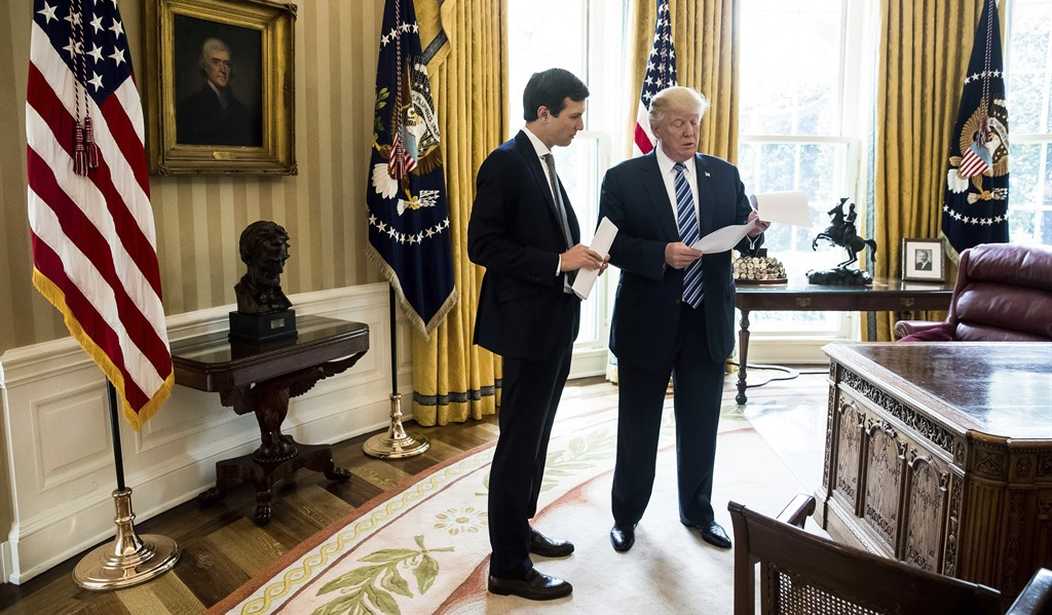It's a little after 3 in the afternoon. Trump says he has already been up and working for 12 hours. He and first lady Melania Trump have met with Argentine President Mauricio Macri and his wife, Juliana Awada.
He has signed an executive order creating an office to protect Department of Veterans Affairs whistleblowers. Then he signed a memo ordering an investigation of the relationship between aluminum imports and national security.
Now, as an exclusive conversation begins, the words, the tone, the messages are vintage Trump. Over the next 40 minutes, he jumps -- in classic Trump fashion -- over a range of topics, from his relations with foreign leaders to the danger of North Korea, from the election last year to his hopes for America tomorrow.
Yet listen closely, especially when he speaks about decisions involving life and death, and you sense that sitting here, in the Oval Office, as the 45th president has even humbled him.
"You can make a mistake in deals, and you work it out," he explains at one point. "You make a mistake here, there is nothing to work out. You know it's trouble. It could be big trouble. And it is life-threatening trouble for lots of people, potentially."
"It's a very intensive process," he says of the presidency. "Really intense.
"When I was doing many real estate deals at one time, I always thought that was going to be more comprehensive and lengthier than a day like this.
Recommended
"It's not."
So far in his presidency, as with so many modern-era presidents before him, much of his focus has been on challenges from abroad.
Freeing a Prisoner
Last week, the Trump administration flew Aya Hijazi, an Egyptian-American aid worker, home to the United States after negotiating her release from a three-year captivity in Egypt.
Trump felt strongly about achieving Hijazi's release, he says, when he met with Egyptian President Abdel-Fattah el-Sissi in April in the Oval Office.
"As you know, President Obama tried to have Aya released for three and a half years," he says. "They were unsuccessful. I was with President el-Sissi for 10 minutes. During that 10-minute session, I said it would be a great honor for this country and I think it would be a very positive step if Aya were released."
Trump explains that Sissi replied, "I would like to consider that," to which he responded that he considered the issue "really very" important.
"And he was so great," Trump says. "He not only released Aya, he released her husband, and he released eight people total ... I thought it was fantastic."
A Legitimate Red Line
In sharp contrast, Trump authorized the U.S. Navy to fire 59 Tomahawk cruise missiles against Syria in April after American intelligence reported that the regime of President Bashar Assad attacked civilians with chemical weapons.
It was, he admits, his toughest decision so far.
"I legitimized President Obama's red line in the sand," he says, "which we had to do. I mean, somebody had to do it."
Nevertheless, he says it was an incredibly difficult moment. "First of all, it is a hard decision. You don't know what is going to happen" once the missiles are fired, he says. "Is one of them going to go haywire and end up in a city or in a town and kill a lot of people?
"But it was an important decision. Not an easy decision to make. Because you know, when you say yes, there is death."
A Tipping Point in North Korea
If his Syria decision was tough, those yet to be made on North Korea and its nuclear weapons sound absolutely nightmarish.
Trump hopes for a diplomatic solution, he says, while bracing himself for something worse.
He describes North Korean leader Kim Jong Un as "very threatening" and "saying terrible things."
"North Korea weighs on me, but we have to be prepared for the worst," he says. "We have to be prepared to do what we have to do. We cannot allow this to go on."
On the other hand, he has nothing but praise for Chinese President Xi Jinping, especially his efforts to prevent conflict involving North Korea, China's erstwhile ally.
His meeting with the Chinese leader at his Florida retreat, Mar-a-Lago, seems to have changed the dynamic between them.
He says: "So when I met him at Mar-a-Lago, which is a dealmakers paradise, and we sat in that living room, in these big beautiful chairs, and we sat there ... 10 minutes, but the 10 minutes turned out to be three hours."
"But I think he is going to try to help us with North Korea," he says. "Because he does not want to see us wanting to attack North Korea. And I think he would love to see if he could work something out."
As the interview ends, the room suddenly fills with White House officials once again. Vice President Mike Pence, chief of staff Reince Priebus and presidential counselor Kellyanne Conway all enter smiling broadly.
An atmosphere -- friendly, happy, energetic -- infuses the Oval Office, which is already glowing with afternoon sunlight. You find yourself wondering what the next discussion among these figures will be, how it might add to the two centuries of history -- sometimes good, sometimes terrifying -- that have unfolded within these curved walls.
And you wonder what keeps this president awake at night.
"Not much," he says simply. "I don't sleep, but then again, I never did."
























Join the conversation as a VIP Member